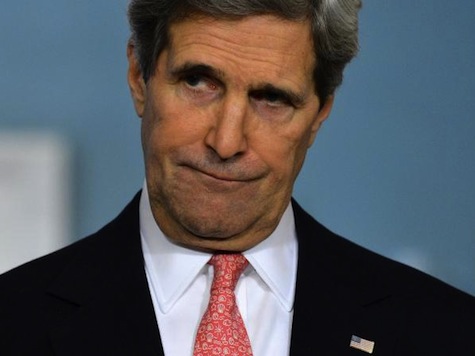The State Department was mum on Monday on accusations that the NSA had been spying on attendees. The deputy spokeswoman would only say that the U.S. “gathers intelligence” the same way many other countries do and that the U.S. works with partners on “concerns” about privacy.
TRANSCRIPT:
QUESTION: Can I ask about the NSA?
MS. HARF: You can.
QUESTION: So what’s the State Department’s position on the NSA apparently spying on the UN? This came out in a German magazine today.
MS. HARF: Mm-hmm. Well, we’ve said this repeatedly, that we’re not going to comment publicly on every specific alleged intelligence activity as a matter of policy. We’ve made clear that the U.S. gathers foreign intelligence of the type gathered by all nations. The U.S. Government will respond through diplomatic channels to our partners and allies around the world when they raise concerns. Clearly, we value our cooperation with all countries in these matters. We also, of course, value the work of the UN and cooperate frequently and often share information, including intelligence.
QUESTION: There is a longstanding agreement, so, I mean, how does this correspond with that?
MS. HARF: I’m sorry, longstanding agreement on what?
QUESTION: As far as the U.S. having a longstanding agreement with the UN stipulating that the U.S. refrain from covert operations in regards to anything that they do.
MS. HARF: I’m not familiar with what you’re referring to. Again, broadly speaking, as a matter of policy, we’ve made clear that we gather foreign intelligence of the type gathered by all nations and I don’t have anything further for you on that.
QUESTION: And did the U.S. – did the U.S. pressure Cuba not to grant Edward Snowden asylum?
MS. HARF: I don’t have anything for you on that.
QUESTION: Does your response – which is not new, I don’t think; it goes back to the beginning of this – that you gather intelligence of the type gathered by all nations —
MS. HARF: Mm-hmm.
QUESTION: — does that mean that U.S. diplomats, U.S. embassies, U.S. missions, diplomatic posts abroad all operate on the presumption that they are being spied upon?
MS. HARF: I would not want to make that broad assumption.
QUESTION: No? Okay, so you don’t?
MS. HARF: I’m not going to make a broad —
QUESTION: You —
MS. HARF: I didn’t say no. I said I’m not going to make a broad assumption —
QUESTION: Well —
MS. HARF: — about every single place everywhere around the world.
QUESTION: Well, is there a presumption that if you are going ahead, if the U.S. Government is conducting the same kind of intelligence activities that all other – or that many other nations, at least – practice, is it presumed that when U.S. diplomats go abroad, they are going to be targets of intelligence gathering by foreign countries?
MS. HARF: I mean, I think it’s clear that we understand there are other people trying to gather intelligence as well, and urge our people to take the necessary precautions when going abroad.
QUESTION: So the answer is yes.
MS. HARF: I don’t want to make a broad statement.
QUESTION: It’s not a trick question. It really isn’t.
MS. HARF: It’s sometimes hard to know with you, Matt —
QUESTION: I know you think it – (laughter) —
MS. HARF: — because so many of them are.
QUESTION: It’s not. I just – like, it’s in —
MS. HARF: Clearly, we’re aware —
QUESTION: — the foreign affairs manual that you should be careful because people are going to be trying to —
MS. HARF: Clearly, we’re aware that there are counterintelligence threats in a variety of places around the world, and urge our people —
QUESTION: Okay.
MS. HARF: — to take the necessary precautions when traveling or working abroad, yes.
QUESTION: Thank you.

COMMENTS
Please let us know if you're having issues with commenting.